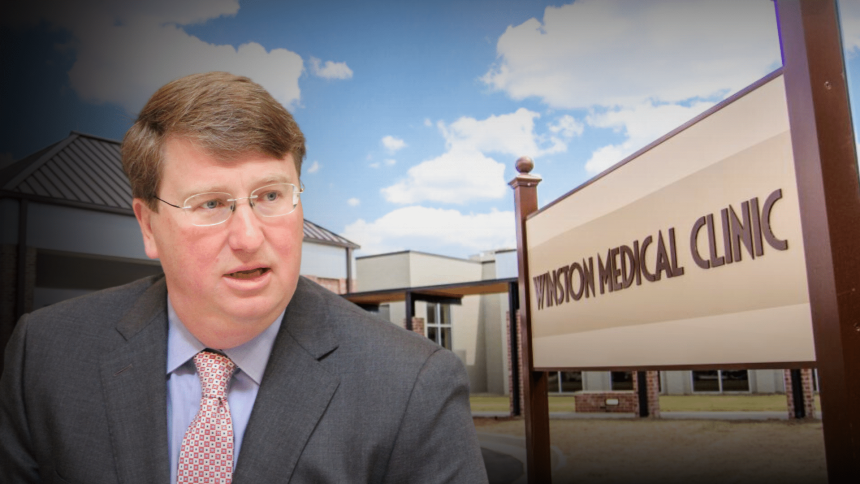Mississippi Governor Tate Reeves last week announced what he called “sweeping Medicaid reimbursement reforms” that are anticipated to generate an estimated $689 million for hospitals throughout the state. However, one medical official is saying the proposal is not a victory for all hospitals.
Reeves, joined by Mississippi Division of Medicaid (MDOM) Executive Director Drew Snyder and eight hospital executives, introduced the following on Thursday:
- The Mississippi Hospital Access Program will provide direct payments to hospitals serving patients in the Mississippi Medicaid managed care delivery system. With these direct payments, hospitals would be reimbursed at the same rate compensated by private insurance, which has been considered the federal ceiling for Medicaid reimbursements in managed care.
- The second initiative will supplement Medicaid base payments for hospitals by reimbursing inpatient and outpatient hospital services at rates in the upper payment limit. Hospitals will pay more to cover the costs of bed taxes and uninsured patients but will be reimbursed at a much higher rate than what they put in.
Matt Woodward, the chief financial officer at Winston Medical Center in Louisville, told SuperTalk Mississippi News that the initiatives will do nothing more than validate claims that the Republican governor has failed Mississippi’s healthcare industry, specifically small and rural hospitals.
“Healthcare is largely considered by most in the industry as a complete failure by the Reeves administration – most notably, rural healthcare. The announcement of Governor Reeves’ Medicaid reimbursement reform on September 21 did very little to change that,” Woodward said. “In fact, it was a slap in the face to most all of the small rural hospitals around the state.”
As part of the proposal from Reeves, 42 percent of the funds ($291 million) will be dispersed among 16 hospitals. The other 58 percent ($398 million) will be distributed among 95 hospitals, most of which are small or in rural areas. That would equal out to $18.19 million per hospital in the first category and $4.19 million per hospital in the second.
Politics is seen as the primary factor in the decision to allocate a lion’s share of the money to certain hospitals over others. Seven of the eight hospital administrators standing behind Reeves during Thursday’s press conference belonged to institutions that left the MHA earlier this year.
While politicos speculate that the alleged favoritism shown toward those who withdrew their MHA membership stems from a $250,000 donation a political action committee associated with the organization made to Democratic gubernatorial candidate Brandon Presley, Woodward argues that the financial contribution to Reeves’ challenger is irrelevant.
Instead, Woodward views it as an attempt by larger systems to remove the “little man” from the table of decision-makers — especially with recently ousted MHA president Tim Moore consistently advocating for all hospitals during his tenure.
The first step in the process of gaining further influence and minimizing small hospitals’ role in these decisions, according to Woodward, was to circumvent Moore. Moore had reportedly worked on similar solutions as the one presented by Reeves, but the difference was that Moore’s plan put small and large hospitals on an equal playing field.
RELATED: Mississippi Hospital Association parts ways with president Tim Moore
“Tim was an advocate for all hospitals in Mississippi. And it is a damn shame how the Reeves political machine chewed him up and spit him out,” Woodward said.
“What they won’t tell you is that Tim and MHA worked on these kinds of solutions with Medicaid for the last several years. Unfortunately, nothing ever came of that because the large facilities felt like the small rural facilities were getting too much of a voice, hence the split of the large facilities from MHA. It had nothing to do with the donation to Brandon Presley.”
All in all, the announcement that larger hospitals would be the overwhelming beneficiaries of the money came as no shock to Woodward.
He pointed to last November when the MDOM introduced an amendment to the SFY 2023 Mississippi Hospital Access Program that would allocate an estimated $450 million to hospitals, with those with a lower average commercial rate expected to receive the bulk of the funds. In the amendment, rural hospitals were placed in a higher tier than urban ones and were projected to benefit more from the apportionment.
Come February, MDOM officials notified hospital administrators that they had overstated the available funding by $400 million without showing industry leaders where the initial calculation went wrong, according to Woodward.
Woodward asserts that the decision to move away from the amendment, especially after receiving no explanation, could have been controlled by larger hospitals in cahoots with Reeves.
“We never received any detail showing the initial calculation or the corrected calculation – only a notification that ‘we messed up.’ They said that our commercial rate was not as low as they had projected,” Woodward recounted. “My worry is that this is another case of the large facilities and systems seeing this and knowing it would not benefit them as much and going behind closed doors to get this amendment squashed.”
Though, on paper, the governor’s initiatives, if approved by Centers for Medicare and Medicaid Services, will provide monetary relief to medical facilities across Mississippi, Woodward and other healthcare leaders continue to argue that Medicaid expansion would be a huge piece of the puzzle when it comes to solving the ongoing crisis.
Woodward would also like to see a rural access payment as another means of funding operations as nearly half of Mississipp’s rural hospitals are in danger of closing.
At the time of publication, Governor Tate Reeves had not responded to a request for comment from SuperTalk Mississippi News.
Editor’s Note: Following the publication of this article, Winston Medical Center CEO Michael Nester reached out to SuperTalk Mississippi News and said Woodward’s comments do not reflect or represent the position of Winston Medical Center on the issues discussed in the article.
“The board and management of Winston Medical Center were not aware of these comments until reading them in the article. The comments made by Mr. Woodward reflect his own personal views and does not reflect or represent the position of Winston Medical Center on the issues discussed in the article. Winston Medical Center appreciates all assistance that may be provided to it during these challenging times for Mississippi hospitals and the patients we serve.”








